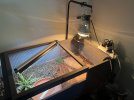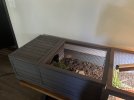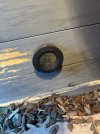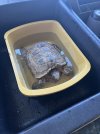With a heavy heart, my tortoise had blood work done and he has been slowly declining for several years (per the previous owner) but the last 2 years we have nurtured him he has really started to decline. We had blood work done recently and he is low in liver enzymes, showing signs of kidney disease, had little to no white blood cells, anemia, low bone marrow, the works. I guess this is from chronic illness over the past 45 years. The CSU vet school said he had a few months left about a year ago and he bounced back for a bit but now another vet says he is shutting down - he won't eat too much and is not very active. We have followed all the dietary restrictions, indoor/outdoor enclosures at perfect and protected temps with orchard barks, 1-2 soaks a day, and natures tortoise grazing grasses, supplements, and so much love. The vet gave him antibiotics but said it probably won't stop his decline. At this point, I am at a loss and I am absolutely heart broken that I can't make this sweet buddy feel or get better. I am thinking I just want to help him feel better physically since he has probably felt poorly for a very long time. I was going to ask the vet for some pain medications but wanted to know what people thought about giving the tortoise CBD for anti-inflammatory, anxiety, and pain relief. Thoughts? Please be kind here. I just want to make sure he has a peaceful exit if that's what his body wants to do after such a struggle for so long 
You are using an out of date browser. It may not display this or other websites correctly.
You should upgrade or use an alternative browser.
You should upgrade or use an alternative browser.
CBD for a DT?
- Thread starter GusBus
- Start date
I don't know enough to advise you about this, but you have obviously given him great care and a very very good life- it's heartbreaking, but sometimes you have to give in to nature.
If this is the case, I so much hope that when you feel ready in the future, you will consider giving another tortoise- perhaps a baby -a happy home with you. There will be another little friend waiting for you to find them.
So so sorry
Angie
If this is the case, I so much hope that when you feel ready in the future, you will consider giving another tortoise- perhaps a baby -a happy home with you. There will be another little friend waiting for you to find them.
So so sorry
Angie
I’m so very sorry, this is heartbreaking. I wish I could answer your question about CBD. Thank you for giving your tortoise such good care and compassion. My heart is with you. ❤️🩹
- Joined
- Nov 17, 2013
- Messages
- 3,398
This seems like a question for your vets. I am a health care professional and also have a good bit of tortoise-related knowledge after 60+ years of keeping them, but I do not know if tortoises metabolize CBD the way humans do or not. I have no idea what its effects might be on your tortoise.With a heavy heart, my tortoise had blood work done and he has been slowly declining for several years (per the previous owner) but the last 2 years we have nurtured him he has really started to decline. We had blood work done recently and he is low in liver enzymes, showing signs of kidney disease, had little to no white blood cells, anemia, low bone marrow, the works. I guess this is from chronic illness over the past 45 years. The CSU vet school said he had a few months left about a year ago and he bounced back for a bit but now another vet says he is shutting down - he won't eat too much and is not very active. We have followed all the dietary restrictions, indoor/outdoor enclosures at perfect and protected temps with orchard barks, 1-2 soaks a day, and natures tortoise grazing grasses, supplements, and so much love. The vet gave him antibiotics but said it probably won't stop his decline. At this point, I am at a loss and I am absolutely heart broken that I can't make this sweet buddy feel or get better. I am thinking I just want to help him feel better physically since he has probably felt poorly for a very long time. I was going to ask the vet for some pain medications but wanted to know what people thought about giving the tortoise CBD for anti-inflammatory, anxiety, and pain relief. Thoughts? Please be kind here. I just want to make sure he has a peaceful exit if that's what his body wants to do after such a struggle for so long
Personally, I would not try it unless directed to do so by a veterinarian you trust.
Metacam/meloxicam is the usual pain medicine of choice for tortoises.
Has an X-Ray been done to rule out kidney/bladder stones? The symptoms you described are similar to those of a tortoise with stones, which are common in captive tortoises.
Has an X-Ray been done to rule out kidney/bladder stones? The symptoms you described are similar to those of a tortoise with stones, which are common in captive tortoises.
The thing about CBD is that because it isn't regulated there is no guarantee for consistency (in plenty of regulated things there also is not good consistency, but that's a different topic). So that means even if you buy some that works great at one point, and buy the exact same thing again, it could have enough different stuff it in it that it could be unsafe (or vice versa). I know people who give it to their dogs for a variety of reasons. If I had a dog at the end stages of life I might consider it as well, but short of that its just to risky, IMO.
It feels like there is so little good info out there on how tortoises to much of anything medical, I can't imagine there's enough info to know how they would respond.
It feels like there is so little good info out there on how tortoises to much of anything medical, I can't imagine there's enough info to know how they would respond.
I know nothing about CBD, but I had another thought...With a heavy heart, my tortoise had blood work done and he has been slowly declining for several years (per the previous owner) but the last 2 years we have nurtured him he has really started to decline. We had blood work done recently and he is low in liver enzymes, showing signs of kidney disease, had little to no white blood cells, anemia, low bone marrow, the works. I guess this is from chronic illness over the past 45 years. The CSU vet school said he had a few months left about a year ago and he bounced back for a bit but now another vet says he is shutting down - he won't eat too much and is not very active. We have followed all the dietary restrictions, indoor/outdoor enclosures at perfect and protected temps with orchard barks, 1-2 soaks a day, and natures tortoise grazing grasses, supplements, and so much love. The vet gave him antibiotics but said it probably won't stop his decline. At this point, I am at a loss and I am absolutely heart broken that I can't make this sweet buddy feel or get better. I am thinking I just want to help him feel better physically since he has probably felt poorly for a very long time. I was going to ask the vet for some pain medications but wanted to know what people thought about giving the tortoise CBD for anti-inflammatory, anxiety, and pain relief. Thoughts? Please be kind here. I just want to make sure he has a peaceful exit if that's what his body wants to do after such a struggle for so long
Most of the care info for DTs is all wrong. If followed, and if the typically recommended practices are used, almost all of them decline and die. Its really really sad, and I do what I can to rectify the situation.
I find people don't soak enough, leave them outside to "hibernate" above ground in one manner or another with inconsistent warm temps, wrong foods, and people don't have any sort of set up with a temperature controlled insulated shelter that allows them to thwart mother natures efforts to make them sick. Yes, some of them survive in the wild, but our backyards are not the wild, and the wild ones spend most of every day deep underground away from the desert extremes found at ground level, where we all tend to keep them. The farther a person is from their native habitat, the more "help" the tortoise will need, but they still need help even in their native habitat. They can survive with the wrong care for many years while slowly declining, but they can also be saved if the missing elements of care, like hydration, diet, and warmth at the right times, are corrected.
The above should not be taken as an insult by anyone. Nearly every source from the government to the pet shops give out this same wrong care info. I learned all the wrong stuff too back in the 80s and 90s, and it took me a good couple of decades to figure out what was wrong, what was right, and why.
With the above info, I have been able to rehab many sick and dying DTs back into health. Maybe its not too late for this one. The correct care info is here, and the shelter is shown and explained:
The Best Way To Raise Any Temperate Species Of Tortoise
I chose the title of this care sheet very carefully. Are there other ways to raise babies and care for adults? Yes. Yes there are, but those ways are not as good. What follows is the BEST way, according to 30 years of research and experimentation with hundreds of babies of many species. What is...
Brumation info here:
Tom's Brumation Thread
Every fall we get bombarded here on the forum with all sorts of questions and problems regarding hibernation and tortoises "slowing down" for winter. The purpose of this thread is to talk about all aspects of this subject, to dispel some of the myths and mysteries, and give a "how to" list of...
More info here:
Info For New People. Please Read This First.
Hello and welcome to tortoiseforum.org! We are all glad you are here! There is no other forum like this anywhere. We have tens of thousands of members from all over the world ranging from kids with their first tortoise to people who have been breeding and keeping high end tortoises since the...
You can see how caring people on this forum are. Everyone with thoughtful and sympathetic responses for you and your tortoise. So you're certainly not alone. Hope it works out for the best, whatever happens.
Hi Tom, Thank you again for the info. We have spoken, many a times. All has been followed by your guidelines and Gus has been cared for exactly as you recommended.I know nothing about CBD, but I had another thought...
Most of the care info for DTs is all wrong. If followed, and if the typically recommended practices are used, almost all of them decline and die. Its really really sad, and I do what I can to rectify the situation.
I find people don't soak enough, leave them outside to "hibernate" above ground in one manner or another with inconsistent warm temps, wrong foods, and people don't have any sort of set up with a temperature controlled insulated shelter that allows them to thwart mother natures efforts to make them sick. Yes, some of them survive in the wild, but our backyards are not the wild, and the wild ones spend most of every day deep underground away from the desert extremes found at ground level, where we all tend to keep them. The farther a person is from their native habitat, the more "help" the tortoise will need, but they still need help even in their native habitat. They can survive with the wrong care for many years while slowly declining, but they can also be saved if the missing elements of care, like hydration, diet, and warmth at the right times, are corrected.
The above should not be taken as an insult by anyone. Nearly every source from the government to the pet shops give out this same wrong care info. I learned all the wrong stuff too back in the 80s and 90s, and it took me a good couple of decades to figure out what was wrong, what was right, and why.
With the above info, I have been able to rehab many sick and dying DTs back into health. Maybe its not too late for this one. The correct care info is here, and the shelter is shown and explained:
The Best Way To Raise Any Temperate Species Of Tortoise
I chose the title of this care sheet very carefully. Are there other ways to raise babies and care for adults? Yes. Yes there are, but those ways are not as good. What follows is the BEST way, according to 30 years of research and experimentation with hundreds of babies of many species. What is...tortoiseforum.org
Brumation info here:
Tom's Brumation Thread
Every fall we get bombarded here on the forum with all sorts of questions and problems regarding hibernation and tortoises "slowing down" for winter. The purpose of this thread is to talk about all aspects of this subject, to dispel some of the myths and mysteries, and give a "how to" list of...tortoiseforum.org
More info here:
Info For New People. Please Read This First.
Hello and welcome to tortoiseforum.org! We are all glad you are here! There is no other forum like this anywhere. We have tens of thousands of members from all over the world ranging from kids with their first tortoise to people who have been breeding and keeping high end tortoises since the...tortoiseforum.org
@Tom - he has antibiotics. Do you think I should give it to him for one last try??Hi Tom, Thank you again for the info. We have spoken, many a times. All has been followed by your guidelines. Thank you for sending again but all your advice has been followed.
Xrays look good. I will ask the vet for those pain meds. Thank you!Metacam/meloxicam is the usual pain medicine of choice for tortoises.
Has an X-Ray been done to rule out kidney/bladder stones? The symptoms you described are similar to those of a tortoise with stones, which are common in captive tortoises.
I wouldn't. What antibiotic is it?I have injection antibiotics for him. Is it worth it to give it a try? This vet said it might not do much but maybe he is fighting off an infection. Thoughts?
I wouldn't. What antibiotic is it?
Vetrijec.I wouldn't. What antibiotic is it?
- Joined
- Nov 17, 2013
- Messages
- 3,398
Vetrijec syringes as I know them are syringes containing a lose dose of insulin earmarked for veterinary use rather than an antibiotic medication. Not sure why your tortoise would even need insulin, but it isn't going to be nearly as effective against an infection as a real antibiotic such as ceftazidime.Vetrijec.
Sorry. It is cedtazidime in syringes to be injected.Vetrijec syringes as I know them are syringes containing a lose dose of insulin earmarked for veterinary use rather than an antibiotic medication. Not sure why your tortoise would even need insulin, but it isn't going to be nearly as effective against an infection as a real antibiotic such as ceftazidime.
- Joined
- Nov 17, 2013
- Messages
- 3,398
Ceftazidime is a very good antibiotic for respiratory illness in tortoises. Once reconstituted and placed in syringes, it must be refrigerated and is good for about 7 days in the refrigerator. Hence, if you have had it for a while now, the efficacy will be diminished.Sorry. It is cedtazidime in syringes to be injected.
I would say it probably won't hurt anything to give it to your tortoise, but I don't recall you mentioning any respiratory symptoms. If you do use it, keep the animal well hydrated (soaked 1-2 times daily) to help it metabolize the drug.
I think it be best I have my enclosure (2.65 ft x 6.5 ft) reviewed by anyone who is inclined, please give me some suggestions. I have attached photos. We have all the proper bulbs per Tom's blog link. Temps are 95-100 in the basking area during the day and on from 10a-5p. The UV light is on about 3 hours during the day. The closed portion of the enclosure is on the other end at a low and average of 70. Humidity will range from 20-50%. He has his outdoor enclosure that gets partial sun around 12p. I don't put him out there unless it's 80 or above. Gus is currently soaking and does about 20 minutes a day. If he was outside all day then I will soak him a second time in the afternoon before going back into his enclosure around 5p. He isn't eating much, doesn't come out of his den area unless I make him and then he is returning to the cooler part of his enclosure to burrow. When I put him outside he doesn't move much but will graze somewhat. His grazing grasses are Crimson Clover, Clover, Fescue, Chicory, Turnip, Rye grasses, aloe and other succulents. He also eats endive, radicchio, arugula, dandelion, collard greens, flowers. I will also sprinkle alfalfa mixes on top of his salad. For the occasional treat he gets carrots, strawberries, tomatoes, cucumbers, peppers. Open to any ideas to get this buddy feeling better. Thank you!! 















All of the following is constructive criticism. Please don't get your feelings hurt and leave. If no one tells you what is wrong, then you won't know what to fix to help your tortoise, and that is my only goal. Helping you and your tortoise.
I see several things that could all be the cause of your problems, or at least contributing factors.
1. The enclosure is far too small. Species half this size need at least 4x8 feet. Your tortoise needs more than that. Why does enclosure size matter? When their enclosure is too small and they can't walk enough, it makes things in the GI tract get backed up, which can cause lethargy and lack of appetite. Small enclosures also seem to send some tortoises into a sort of "depression" for lack of a better term. He needs more space.
2. That basking bulb looks like a mercury vapor bulb. Is it? If yes, that might be your problem. Some of those make no UV after a few months, which should not be a problem since your tortoise gets outside and has other indoor UV. If it is making the correct amount of UV, then it is too much in combination with your other UV tube. Some MVBs make WAY too much UV, and it can cause photokeratitis, which will cause lethargy and lack of appetite.
3. How are you measuring the temp under the basking bulb? The little disc off to the side stuck to the wall is not the way to do it. This tortoise's carapace looks like it was burned previously in years passed. You need to get a digital thermometer that records the lows and the highs, set it on its back on top of a block of wood or a brick or something to make it tortoise shell height, and let it bake directly under the bulb for an hour or more. This will tell you the temperature at tortoise shell height, and then you can adjust the fixture up or down to get the correct temperature.
4. 10am to 5 pm isn't even long enough to be a short winter day for a CA DT. The "sun" needs to be up for at least 12-13 hours a day, unless you are trying to tell your tortoise it is brumation time. 7 hours of daylight will cause lethargy and lack of appetite. Set the basking bulb light timer for 6:30 am to 7:30 pm, or something similar that suits you.
5. You need more ambient light. Think how bright it is in the CA desert in the day time. You have a dim UV bulb on for 3 hours, and a dim basking bulb on for 7 hours. This tortoise thinks its a cloudy short winter day. My ambient lighting is so bright that I can't tell if my UV tube is on or off unless I bend down and look up at the tube. Add some simple efficient LED strips or bulbs in the 5000-6500K color range. Set them on the same 12-13 hour timer at the basking bulb.
6. Not related to your tortoise's health issues, but that lamp fixture is not safe or suitable. You need a ceramic based fixture, and the lamp needs to be hung from overhead. Those bakelite black plastic fixtures are a safety hazard when used in this way. They aren't meant to be on all day every day and they frequently short out. Get the right fixture at Home Depot for about $13, and hang it from over head. Those clamps ALWAYS fail eventually and are not safe to use. I remove the clamps and use the metal hanger that comes with it instead. I also drape the cord in such a way that if the metal hanger were to fail, the cord would hold up the fixture and prevent a fire.
7. Let's move outdoors: That enclosure looks great, BUT... its in the wrong area. A tortoise enclosure needs to be in a sunny area, unless you live in Phoenix AZ, and then shade all day is preferable because its 118 degrees outside. DTs need sunshine. They need to be able to bask first thing in the morning to warm up to operating temperature, and they need to be able to move in and out of the sun all day to maintain the correct operating temperature. If its not sunny until noon, then this is not a suitable place for a tortoise enclosure. Ideally, there will be somewhere in the enclosure all day long from sun up to sun down where the tort can get direct sunshine. Shade it also important, but they must have sun.
8. Have you identified and verified the safety of each and every plant in that lush beautiful garden enclosure? Many people mistakenly believe that tortoises won't eat toxic plants. Sometimes they do choose not to, but other times they do. Some plants poison them slowly over a long period of time, insidiously shutting down their organs, while other plants kill them quickly. I've seen both happen. People will sometimes say "Well they have survived for million of years without our help, so I think they know what to eat and what not to eat..." Sure they do, with their native plants in their native ranges, but even in the wild 300 die for every one that makes it to maturity. Do some of those that didn't make it die from eating toxic plants? I don't know, but its certainly possible. In captivity with all of our decorative plants from all over the globe, as well as introduced invasive plants, their are all sorts of toxic plants that our tortoises might get exposed to.
Any or all of this might be causing your problem. See why I complain about most tortoise vets? Did any of them ask about or evaluate any of the things I just mentioned? Most of them probably don't even know about the things I just mentioned. They attempt to treat the symptoms they are presented with, but they don't spend time looking for the CAUSE of the symptoms. It does no good to treat symptoms if the cause of the problem has not been identified and eliminated.
Much for you to think about. Questions are welcome. Argue with any of this. Ask for more explanation on anything that seems wrong or unclear. I hope we can save your tortoise.
I see several things that could all be the cause of your problems, or at least contributing factors.
1. The enclosure is far too small. Species half this size need at least 4x8 feet. Your tortoise needs more than that. Why does enclosure size matter? When their enclosure is too small and they can't walk enough, it makes things in the GI tract get backed up, which can cause lethargy and lack of appetite. Small enclosures also seem to send some tortoises into a sort of "depression" for lack of a better term. He needs more space.
2. That basking bulb looks like a mercury vapor bulb. Is it? If yes, that might be your problem. Some of those make no UV after a few months, which should not be a problem since your tortoise gets outside and has other indoor UV. If it is making the correct amount of UV, then it is too much in combination with your other UV tube. Some MVBs make WAY too much UV, and it can cause photokeratitis, which will cause lethargy and lack of appetite.
3. How are you measuring the temp under the basking bulb? The little disc off to the side stuck to the wall is not the way to do it. This tortoise's carapace looks like it was burned previously in years passed. You need to get a digital thermometer that records the lows and the highs, set it on its back on top of a block of wood or a brick or something to make it tortoise shell height, and let it bake directly under the bulb for an hour or more. This will tell you the temperature at tortoise shell height, and then you can adjust the fixture up or down to get the correct temperature.
4. 10am to 5 pm isn't even long enough to be a short winter day for a CA DT. The "sun" needs to be up for at least 12-13 hours a day, unless you are trying to tell your tortoise it is brumation time. 7 hours of daylight will cause lethargy and lack of appetite. Set the basking bulb light timer for 6:30 am to 7:30 pm, or something similar that suits you.
5. You need more ambient light. Think how bright it is in the CA desert in the day time. You have a dim UV bulb on for 3 hours, and a dim basking bulb on for 7 hours. This tortoise thinks its a cloudy short winter day. My ambient lighting is so bright that I can't tell if my UV tube is on or off unless I bend down and look up at the tube. Add some simple efficient LED strips or bulbs in the 5000-6500K color range. Set them on the same 12-13 hour timer at the basking bulb.
6. Not related to your tortoise's health issues, but that lamp fixture is not safe or suitable. You need a ceramic based fixture, and the lamp needs to be hung from overhead. Those bakelite black plastic fixtures are a safety hazard when used in this way. They aren't meant to be on all day every day and they frequently short out. Get the right fixture at Home Depot for about $13, and hang it from over head. Those clamps ALWAYS fail eventually and are not safe to use. I remove the clamps and use the metal hanger that comes with it instead. I also drape the cord in such a way that if the metal hanger were to fail, the cord would hold up the fixture and prevent a fire.
7. Let's move outdoors: That enclosure looks great, BUT... its in the wrong area. A tortoise enclosure needs to be in a sunny area, unless you live in Phoenix AZ, and then shade all day is preferable because its 118 degrees outside. DTs need sunshine. They need to be able to bask first thing in the morning to warm up to operating temperature, and they need to be able to move in and out of the sun all day to maintain the correct operating temperature. If its not sunny until noon, then this is not a suitable place for a tortoise enclosure. Ideally, there will be somewhere in the enclosure all day long from sun up to sun down where the tort can get direct sunshine. Shade it also important, but they must have sun.
8. Have you identified and verified the safety of each and every plant in that lush beautiful garden enclosure? Many people mistakenly believe that tortoises won't eat toxic plants. Sometimes they do choose not to, but other times they do. Some plants poison them slowly over a long period of time, insidiously shutting down their organs, while other plants kill them quickly. I've seen both happen. People will sometimes say "Well they have survived for million of years without our help, so I think they know what to eat and what not to eat..." Sure they do, with their native plants in their native ranges, but even in the wild 300 die for every one that makes it to maturity. Do some of those that didn't make it die from eating toxic plants? I don't know, but its certainly possible. In captivity with all of our decorative plants from all over the globe, as well as introduced invasive plants, their are all sorts of toxic plants that our tortoises might get exposed to.
Any or all of this might be causing your problem. See why I complain about most tortoise vets? Did any of them ask about or evaluate any of the things I just mentioned? Most of them probably don't even know about the things I just mentioned. They attempt to treat the symptoms they are presented with, but they don't spend time looking for the CAUSE of the symptoms. It does no good to treat symptoms if the cause of the problem has not been identified and eliminated.
Much for you to think about. Questions are welcome. Argue with any of this. Ask for more explanation on anything that seems wrong or unclear. I hope we can save your tortoise.
Similar threads
- Replies
- 3
- Views
- 12K
- Replies
- 2
- Views
- 912
- Replies
- 8
- Views
- 2K